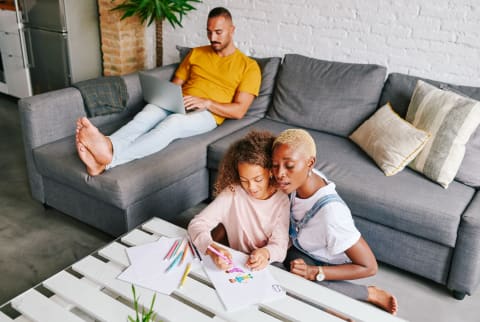Advertisement
A Parenting Expert On How To Teach Your Child To Self-Soothe With One Easy Trick


When my daughter was in the second grade, she developed severe anxiety, to the point that she cried from the beginning of school to the end on most days. She begged me to home-school her. Because that is my worst nightmare, I refused. That situation would not have helped either of us.
But I did bend over backward to help her develop coping skills. For weeks, I sat in the school office all day, every day, and she was allowed to check in with me every 20 to 30 minutes. Supportive staff at her school helped her with this process. Eventually, we weaned off that approach and I sat outside the school. Then, we whittled down the amount of time I was there.
While these strategies helped her cope in the short term (and kept me out of home-schooling), it wasn't until we found her a terrific cognitive behavioral therapist that she learned the skills to soothe herself rather than relying on seeing me to get her through the day. Now, as a young adult, my daughter is both independent and accomplished.
I was lucky enough to be self-employed when we were going through the high-anxiety days, and I know I was incredibly lucky to have that kind of flexibility. Each parent does what they can within their set of circumstances.
Regardless, when facing a crisis, parents can be supportive in making the problem manageable, but they shouldn't feel the burden of responsibility to eradicate the problem. When we clear problems out of our kid's way, they learn that's how problems are solved—by someone else. They don't get to practice coping.
The "try this first" approach
Most tweens get overwhelmed by their emotions and regularly ask their parents to fix things, even when they can't articulate why or how or what needs fixing. Here's something you can do to mitigate this behavior in your home.
When your tween is happy and relaxed, ask them to make a list of things that help them feel better when they are anxious or upset. You might say, for example, "Hey, I read about this idea in a book, and I wanted to try it with you. When something is upsetting, it helps to have a list of easy-to-access and relatively simple things you can do on your own that make you feel better. What are 10 things that usually make you feel better when you're upset?"
I call this activity "Try This First." By way of example, a Try This First list might include: shooting baskets, reading, watching a TV show, baking, doing yoga, taking a bath, turning off screens, meditating, watching YouTube videos of puppies, drawing, listening to music, running, and so on. Resist the urge to edit your kid's list. You may hate YouTube, but if 20 minutes of watching videos helps them regulate, it can't be all bad.
Your child's vague despair can render you impotent to help. Try This First gives you something to do and say. For example, imagine your child comes home in tears after a rough day. You ask what's wrong, but they can't, or won't, articulate. Of course, you want to make them feel better, but you don't know what to do. Rather than shouldering the burden of having to uncover this mystery and then figuring out what might actually make it better, you could say, "I'm sorry you are having a tough time. Why don't you look at your list and choose one thing to do for the next 20 minutes?" (Note: If you're feeling generous, you could even offer to make a snack while they're looking at their list.) "Come find me when you're done, and I'll be here to talk."
The key to this approach is to offer support while at the same time conveying confidence that your child can figure out how to feel better. This will help them develop a belief that they aren't actually helpless, even though they feel overwhelmed. Want to empower your tween even more? Ask them to help you create a Try This First list of your own. This is a nice way to subtly reveal your humanity to your child and give them an opportunity to think of someone's needs outside of their own (a practice all adolescents benefit from, whenever possible). Your kid's involvement in helping with your list also encourages their buy-in for when you need time in the future for your own self-care.
Adapted from Fourteen Talks by Age Fourteen copyright © 2021 by Michelle Icard. Used by permission of Harmony Books, an imprint of Random House, a division of Penguin Random House LLC. All rights reserved. No part of this excerpt may be reproduced or reprinted without permission in writing from the publisher.











